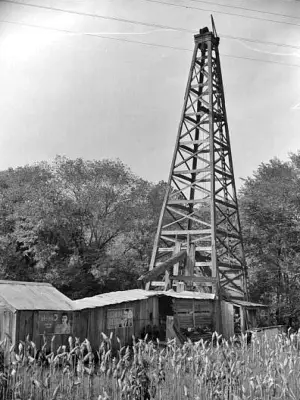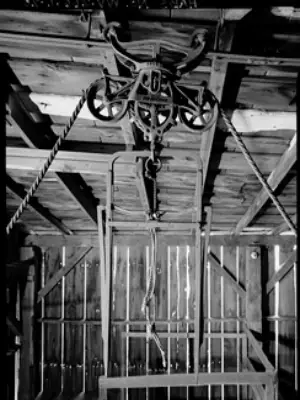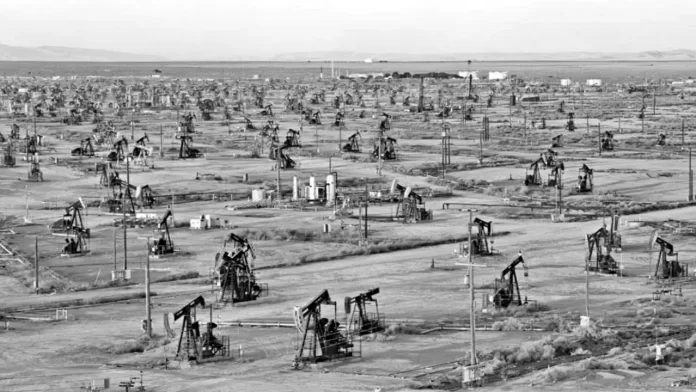In the early 1900s, West Virginia was a land of rugged beauty and hardworking people. Farmers toiled in their fields while oil workers drilled for black gold. But amidst this industrious landscape, a chilling tale unfolded—one that still sends shivers down spines today. This is the story of ghostly revenge in the West Virginia oil fields.
A Tragic Accident Turns Deadly
One summer afternoon, a young farmer’s son was working on his family farm. He was pitching hay when tragedy struck. In an unfortunate slip, he fell onto his pitchfork. The sharp tines pierced his chest, killing him instantly. A worker from a nearby oil derrick discovered the body.
The oil worker pulled the pitchfork out of the boy’s chest and stood over him, trying to process what had happened. But fate had something darker in store for him.

Four farmers appeared on the scene. They were tipsy, having stopped for drinks after work. When they saw the oil worker standing over the lifeless body, they jumped to conclusions. They accused him of murder.
Rush to Judgment
Irrationally, the men decided to take matters into their own hands. One of them grabbed a rope, threw it over a tree limb, and the group dragged the protesting oil worker to the makeshift gallows.
Before they hanged him, they asked if he had any last words. Defiant to the end, he spit in their faces and declared, “I’ll see all of you in hell! You’ll die just like me within thirteen days.”
With those ominous words, they hanged him.
Curse Begins
After the hanging, one of the four men stayed behind to bury the oil worker’s body. He loaded the corpse onto a wagon and headed toward the woods. But as he drove along a narrow road above a steep embankment, disaster struck.

His horses became spooked, and the wagon overturned. The man was thrown twenty feet down the embankment. His neck landed between two branches, snapping it instantly.
When his body was found, authorities ruled it an accident. But witnesses reported seeing a dark figure lurking in the woods near the scene.
Death Strikes Again
Three days later, the second man was found dead. He was hanging from a rope in his barn, suspended from a hay mow. It looked like he had slipped and fallen onto the rope by accident.
But again, witnesses claimed they saw a dark form near the barn before the body was discovered.
Fear Spreads Among the Remaining Two
By now, the remaining two men were terrified. They couldn’t shake the oil worker’s curse. Was his prediction coming true? Who would be next?
Nine days after the first death, the third man was found hanging by the neck between two steel crosspieces on an oil derrick. Once again, witnesses reported seeing a strange, shadowy figure in the woods near the derrick.
On the thirteenth day, the fourth man was found dead. He was hanging from a rafter in his kitchen. Authorities labeled it a suicide, but his wife swore she had seen a dark form lurking around their farm in the days leading up to his death.
After her husband’s passing, the dark figure vanished. It never appeared again.
Did the Ghost of the Oil Worker Return?
Was the oil worker’s curse real? Did his ghost help fulfill his grim prediction?
Many believe the oil worker’s spirit sought justice. After all, he was innocent. He didn’t kill the farmer’s son—it was a tragic accident. Yet, he was lynched without a fair trial.
The deaths of the four men seem too coincidental to dismiss. Each one mirrored the oil worker’s fate, and each time, witnesses reported seeing a dark figure nearby.
Why This Story Still Haunts Us
This tale from the West Virginia oil fields is more than just a ghost story. It’s a reminder of how fear and irrationality can lead to terrible consequences. The four men acted out of anger and alcohol-fueled judgment. Their actions unleashed a chain of events that ended in their own deaths.
But the story also raises questions about justice. Did the oil worker’s ghost seek revenge, or was it simply a series of tragic accidents?
- Think Before You Act: The four men made a rash decision that cost them their lives. Always pause and consider the facts before jumping to conclusions.
- Justice Should Be Fair: The oil worker didn’t get a chance to defend himself. True justice requires fairness and evidence, not mob rule.
- Respect the Dead: Whether you believe in ghosts or not, treating others with respect—even in death—can prevent lingering guilt or fear.
So, the next time you hear about the haunted oil fields of West Virginia, remember this tale. And ask yourself: Do you believe in ghosts? Or do you think it was just a string of eerie coincidences?
What do you think happened? Share your thoughts below!

